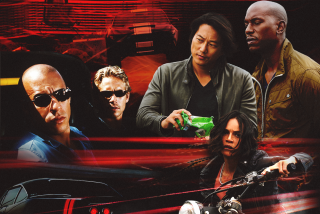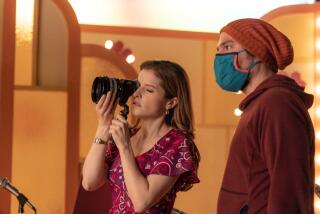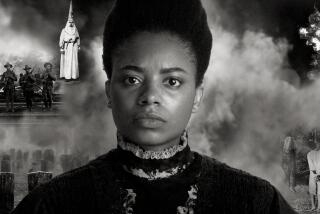New land, same guilty pleasure
As of today “Cars” is not the only automotive movie in town. “The Fast and the Furious: Tokyo Drift” has motored onto screens everywhere, and it is a whole different box of gears. Sort of.
This third installment of the popular series about fast cars and the posturing boys who love them is best viewed as an energetic cartoon, an unintentionally amusing, head-shaking guilty pleasure that will divert those not in the mood for anything more profound than gleaming metal and preening women.
Savvy producer Neal H. Moritz has taken to calling “Tokyo Drift” “a lifestyle movie,” which apparently means it depicts a way of life so fantastical and preposterous no one could possibly live it for real.
Set in what an on-screen title tells us is “Tokyo, Japan” (to differentiate it from the many other Tokyos that presumably dot the globe), “Tokyo Drift” is in love with all things automotive to an extent that might be called carnographic. This is a film in which the seven primary cars have as much personality as the characters who drive them and a company that provided the “Japanese high performance clutches” gets major thanks in the credits.
But you always hurt the one you love, especially in movies like this, and cars, outfitted with tires that do more squealing than a roomful of Justin Timberlake fans, do take quite a beating.
As orchestrated by legendary second unit director-stunt coordinator Terry Leonard, the film’s chases and races utilized close to 250 vehicles, cutting up 25 and destroying more than 80. That’s why the film ends with the stern reminder (intended, no doubt, for the same people who didn’t know Tokyo was in Japan) that “the motor vehicle action sequences depicted in this film are dangerous.” In case you were wondering.
Not so banged up are the film’s numberless lithe young Japanese women in tiny Sanja Milkovic Hays-designed miniskirts who masochistically flock to young men who lust mainly after cars.
There are so many it seems there must have been an eye-candy casting director working full time to corral this particular coalition of the willing.
Given all this attention to “lifestyle,” Justin Lin (“Better Luck Tomorrow”) was a smart choice to direct. One of the many Sundance alumni who’ve gone on to mainstream careers, Lin’s ability to treat an overly familiar tale with complete seriousness (evident also in the James Franco-starring “Annapolis”) is just what this film needs to be all that it can be.
Filled with actors chosen for their ability to convey attitude as much as anything else, “Tokyo Drift” does especially well with charismatic Alabama-born Lucas Black (“Jarhead,” “Friday Night Lights”) as protagonist Sean Boswell.
Screenwriter Chris Morgan starts the film with an American prelude that establishes Sean as an anti-authority type way too cool for high school, a Steve McQueen knockoff who, as someone says later, “doesn’t just play with fire but soaks the matches in gasoline.”
An ill-advised “Rebel Without a Cause”-influenced race ends badly for Sean and he has to get out of town, way out. That means Tokyo (the one in Japan), where his divorced father conveniently lives.
“Drift,” which could have been subtitled “Plausibility Takes a Holiday,” thinks it’s perfectly reasonable to send Sean to a high school where the teaching is done exclusively in Japanese. Not that it matters, he’s never there anyway, he’s up to his crank shaft in racing Japanese style.
After picking up a sidekick (Bow Wow) and becoming infatuated with a classmate (Nathalie Kelley), Sean learns that her boyfriend (Brian Tee) is nicknamed D.K. because he is the drift king, the master of a style of racing that involves the kind of controlled sliding that, oddly enough, resembles the technique Lightning McQueen has to learn in “Cars.”
Under the tutelage of the Zen-like Han (Sung Kang), Sean picks up pointers on drifting and absorbs the kind of lessons (“Life’s simple: You make choices and you don’t look back”) “Tokyo Drift’s” intended audience will likely regard as profound.
Naturally, there is a big race at the end of this episode of “The Fast and the Furious,” and it involves a Yakuza crime boss (action veteran Sonny Chiba) and considerable drifting, both morally and automotively.
If there is a better way to learn a lesson about life than nearly killing yourself behind the wheel, Hollywood has yet to discover it.
*
‘The Fast and the Furious: Tokyo Drift’
MPAA rating: PG-13 for reckless and illegal behavior involving teens, violence, language and sexual content.
A Universal Pictures release. Director Justin Lin. Screenplay Clayton Townsend, Ryan Kavanaugh, Alfredo Botello. Director of photography Stephen F. Windon. Editors Fred Raskin, Kelly Matsumoto. Running time: 1 hour, 44 minutes.
In general release.
More to Read
Only good movies
Get the Indie Focus newsletter, Mark Olsen's weekly guide to the world of cinema.
You may occasionally receive promotional content from the Los Angeles Times.











